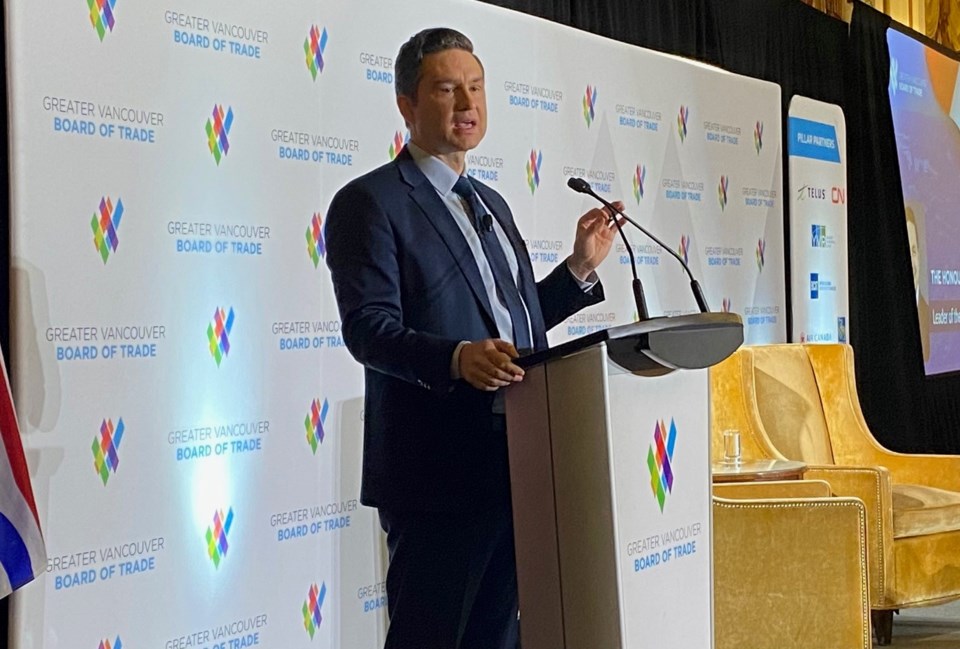Conservative Party Leader Pierre Poilievre challenged B.C. Premier David Eby to cancel the April 1 carbon tax hike at Greater Vancouver Board of Trade (GVBOT) breakfast meeting Friday morning, and scolded business leaders for “sucking up” to government when they should be pushing back against policies that are against their own interests.
In front of a sold-out audience of 325 GVBOT members Friday, Poilievre sketched out his vision for Canada – a Monopoly board of sorts where Canadians will have the opportunity to buy -- or at least rent -- a home, and where repeat offenders will go straight to jail without being eligible for bail.
“My common sense plan to axe the tax, build the homes, fix the budget, stop the crime is a bottom-up, free-enterprise agenda, not a top-down state capitalism agenda,” Poilievre said.
He said the federal carbon tax adds to inflation by raising the price of food, and called for a halt to the carbon tax hike that is coming federally and provincially on April 1.
“I am announcing today that I am calling on NDP Premier David Eby and Justin Trudeau and Jagmeet Singh to cancel the April 1 carbon tax hike,” Poilievre said, to applause.
Should he lead his party to power next year, Poilievre said a Conservative government would:
- put scanners in Canadian ports to stem the flow of drugs and illegal guns;
- encourage LNG exports;
- empower First Nations entrepreneurialism;
- speed up mining permits;
- reward municipalities that speed up new home construction, and penalize those that don’t;
- scrap the $35 billion Canada Infrastructure Bank; and
- ensure prolific offenders do jail time.
On energy, Poilievre said Western Canada’s abundant natural gas, clean power grid and cold climate gives it an advantage as a liquefied natural gas producer. He pointed to the fact the U.S. has built seven LNG plants in the last eight years and the Germans built an LNG receiving terminal “from concept to completion in 194 days,” while Canada has not yet seen an LNG plant completed.
He vowed to repeal “insane anti-development laws” like Bill C-69 – Canada’s new environmental law, the Impact Assessment Act – “and grant rapid permits to environmentally friendly and strategically important projects, like LNG facilities.”
He added his government would also speed up the permitting of new mines and promote the construction of nuclear power.
“Right now, it takes 18 years to get a mine approved in Canada,” he said.
Poilievre pointed to the Squamish First Nations' Sen̓áḵw development in Vancouver as a model for getting things done when government "gatekeepers" aren't involved. The project is being built on Squamish land, and therefore avoids city hall bureaucracy. He pledged to encourage First Nations enterprise.
"The First Nations are going to be leading the way as the most enterprising communities in this country when I'm prime minister," he said. "And I will ensure they are richly rewarded for their entrepreneurial talents."
Poilievre said industry should not expect "a free ride" from government, and scolded big resource companies that have not pushed back on policies that are counterproductive to Canada's and their own interests.
“Resource corporations who have proposed these projects and then sat back and done nothing to convince people of their benefits, they are going to have to stand up and fight,” Poilievre said.
“Frankly, when I meet resource companies, they come to Ottawa, and all they do is suck up to the Liberal government. They have no backbone, and no courage and they don’t fight for their workers. I want to see corporate leaders actually fighting for their workers and fighting for their pay cheques, instead of sucking up to the very people who are blocking these jobs.”
Poilievre vowed to address Canada's housing crisis. He said it's simply too expensive to build homes in Canada. Investment in residential housing represents nine per cent of the economy, Poilievre said, whereas the OECD average is four per cent.
“We are spending twice as much as the rest of our competitor countries to build fewer homes,” he said.
Poilievre has vowed to wage war on “gatekeepers” who stand in the way of getting things done.
He would to link federal transfers to new home construction as a way to encourage quicker approval and construction timelines.
“We will require municipalities to permit 15 per cent more home building per year as condition of getting their federal money," Poilievre said.
Likewise for public transit, he said federal funding will go into a trust, and regional and municipal governments will need to borrow the money to build new transit infrastructure.
“The money will only be released to them when all of the available land around the station is surrounded by high-density apartment complexes that are occupied by people," he said.
On crime, Poilievre noted that a small number of repeat offenders and "career criminals" are responsible for the majority of crimes. He said he would repeal Bill C-75 to restore bail requirements for repeat offenders.
"A common-sense Conservative government would make it so that repeat violent offenders are no longer eligible for immediate bail," Poilievre said. "It will be jail and not bail."
He added a Conservative government would tight security at ports to stem the flow of guns and drugs into Canada.
"Right now, we only inspect one per cent of the shipping containers that come in and go out of our ports," he said. "No wonder illegal drugs and guns can get in so easily and the stolen cars get out so easily."
He said a Conservative government would install scanners at ports so that every container that comes in or goes out would be scanned.
As for drugs and drug addiction, which is part of the general decay in cities across Canada have been experiencing, Poilievre said a Conservative government would stop funding safe consumption sites and the distribution of drugs, and invest in treatment and recovery instead.




